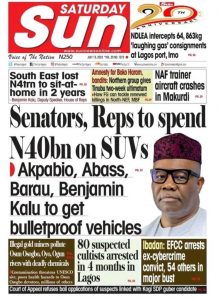It is still a sprinkle of endorsing and opposing standpoints to the Federal Government of Nigeria’s plan to spend over N500b on palliatives to cushion the crippling effects of the fuel subsidy withdrawal. Only a few notable individuals, civil society organisations and even governments are taking positions on the plan.
Presidential candidate of the Labour Party, Peter Obi, has described it as inadequate. Obi’s standing as a leading opposition presidential candidate makes even a word from him on the palliatives plan significant than would have been the case if otherwise. The word inadequate is thus heavily pregnant, even without elaboration. But the intervention that has hit the palliatives move most is the one from Charly Boy, particularly the sentence where he hit the Tinubu-led administration for earmarking N8,000 for 12 million suffering families monthly, while allocating N70 billion for National Assembly members who are less than 500”.
Similarly, other NGOs such as the Civil Society Legislative Advocacy Centre (CISLAC) are insisting on using the N500b to elevate the infrastructural standard in the country. Kano State Government reported earlier for criticising the palliative measures as being lopsided has denied any such criticism. It thus stands withdrawn.

SERAP’s anger
All these suggest a possible turn into a deluge, especially when intertextualised to the demand by Socio-Economic Rights and Accountability Project, aka SERAP is asking the National Assembly leaders to halt a planned expenditure of more than a N110b on bulletproof cars as well as other item of palliatives for the leaders and members of the legislature.
What is certain is that Nigerians aren’t finished with the palliatives. By the time, it is implemented, it may not be what Presidential righthand man, Dele Alake, read out while declaring a food emergency directed by the president. That is politics in its classical sense: the clash of competing interpretations of any reality towards a consensual meaning of it. That is the strategy of hegemony in a Laclau sense. It is the only way to make democracy substantive in a country where IMF/World Bank scholars and practitioners have taken control of policy, running the show with tender-preneurs (instead of entrepreneurs), contractors, consultants and sundry unpatriotic elements. The only drawback is that the various voices have not transformed into a hegemonic block. The day that happens, Nigeria would have turned the corner for the power of vast majority who are voiceless and invisible.

Structural Adjustment or whatever name the IMF and the World Bank calls it will continue to bring down any and every government across Africa because it is an impossibility
How soon that happens in a country substantially locked into static, colonising black boxes of science, reason, truth and progress promoted by Enlightenment philosophy remains to be seen but that possibility is taking hold.
As already mentioned, the list of institutions and strategies that Dele Alake read out while declaring a food emergency sounds holistic. But they are the same institutions, personnel and models that have not delivered over the years. What would have changed so suddenly?
If the Government has that amount to plug into palliatives, instead of an N8, 000 handout, why not experiment with something more novel? Wouldn’t experimenting with state farms serve a more innovative purpose.
Starting with one in each of the geopolitical zones may offer something more substantive. Millions will be instantly engaged, some of them needing only a piece of land in such a farm because they are already doing something useful for themselves. Millions of graduates will be engaged in particular. State farms provide a comprehensive approach to development since every farm will eventually have all the facilities – housing, schooling, electricity, health facilities and security. The funding is gradual, meaning that it puts no pressures on government financing. As beneficiaries are incubated therein, they have no way of evading repayment. Participants will learn skills and transform into experts. It answers the food insecurity better and in the shortest possible time. With stable food production, agro-industrial transformation comes into the agenda, almost simultaneously. The Federal Government can then explore Fair Trade, interconnecting state farms with foreign policy. This is a strategy without disadvantages except the few indolent speculators killing the country on behalf of their patrons.
Nobody would argue that it would be easy to manage millions of human beings that would be involved in a move like this. The point, however, is that if the president of Nigeria wants Nigerians he can entrust this to, with success guaranteed, he will find them. There are Nigerians the president can call, invest them with the responsibility and they will deliver. There are Nigerians with the conceptual framework (without which nothing will be achieved); the comparative appraisal of what we are talking about here; who have the models or an idea of the models most applicable to Nigeria at this point and who have a sense of standard. Above all, Nigerians who will not steal the money or be intimidated by any interests – local, foreign or terrestrial.
The point is the imperative of raising the stakes in governance. A president Tinubu is not constrained in anyway from raising the stakes, given the age and circumstances at which he ascended power. It will be difficult for him or any president of Nigeria at this point to impress History with mundane language and practices such as palliatives, subsidy and so on. The honeymoon is over and there are only rooms for elevated governance. Anybody is capable of elevated governance and there should be no wasting of time on that.
By the way, why is a week-long debate on the best form of palliatives not an option in terms of the starting point? The Federal Government may not take anything from the debate eventually but the debate can throw up an idea capable of prompting something else which a president can use his native intelligence to switch Nigeria into an irreversible momentum.




























